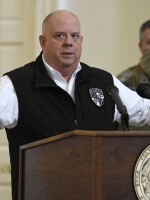House Speaker Paul Ryan on Tuesday downplayed a threat by President Trump to revoke security clearances for a number intelligence officials who served under President Barack Obama as "trolling" and not a political act.
"I think he's trolling people, honestly," Ryan told reporters. "This is something that is in the purview of the executive branch."
Ryan moved on quickly when asked whether it is dangerous for Trump to threaten people's security clearances over politics. Democrats and Republicans have warned that revoking classified access over political dissent could have a chilling effect on the intelligence community.
On Monday, White House press secretary Sarah Sanders told reporters that the former officials could lose security clearance over political statements. The list includes former CIA Director John Brennan; former Director of National Intelligence James Clapper; former FBI Director James Comey; retired Gen. Michael Hayden, a former director of the CIA; former national security adviser Susan Rice; and former FBI Deputy Director Andrew McCabe.
"The president is exploring the mechanisms to remove security clearance because they've politicized and, in some cases, monetized their public service and security clearances," Sanders said. "Making baseless accusations of improper contact with Russia or being influenced by Russia against the president is extremely inappropriate."
Several people on the list, including Clapper, immediately rejected that description.
"I think this is a real abuse of the clearance system," Clapper said on CNN. "And is that now going to become a criterion for obtaining a clearance anywhere in the government? A pledge of fealty or loyalty to President Trump?"
Others, like Hayden, say they no longer receive classified briefings and don't intend to change their behavior as a result of the threat.
I dont go back for classified briefings. Won’t have any effect on what I say or write
— Gen Michael Hayden (@GenMhayden) July 23, 2018
Others, including Comey, have already had their clearances revoked.
The move has been met with widespread criticism from people in the intelligence community. Former CIA officer John Sipher told NPR's Morning Edition that while Trump has the right to revoke security clearances, he disagrees with the reasoning.
"Trump is revoking these clearances not because they did anything wrong or can't be trusted, but because they disagree with him," Sipher said. "He's trying to punish the people who criticize him, right, so in a sense, this does send a signal, potentially, to people in the government that there's some sort of loyalty test to having a security clearance."
Some Republicans in Congress, like Virginia Republican Rep. Scott Taylor, say it would be wrong to consider political speech when issuing clearances.
Hi Doug. 1. If someone w/clearance has done wrong, hold them accountable. I represent area w/prob more sec clearances than any other. Clearances should not arbitrarily be revoked because those in power are politically opposed. I disagree too, but this is the US w/1st amend https://t.co/Yyzun4KGSU
— Scott Taylor TEXT “Taylor” to 41411 (@Scotttaylorva) July 24, 2018
Ryan on Tuesday also addressed Russian President Vladimir Putin's potential visit to Washington. Ryan told reporters that he would not invite Putin to Congress while he is in town.
Typically, visiting heads of state are asked to travel to the Capitol for a ceremonial visit, including a speech before a joint meeting of the House and the Senate.
But Ryan says Putin would not get that same invitation.
"We certainly will not be giving him an invitation to do a joint session," Ryan said. "That's something we reserve for allies."
Ryan said he doesn't have a problem with presidents meeting with heads of state; what matters is what they discuss in those meetings. Ryan said he hopes Trump will stress to Putin that Russia cannot interfere in U.S. affairs.
"If the message is stop meddling in our country, stop violating our sovereignty, then I support that," he said. "But it's the message that counts."
Copyright 2020 NPR. To see more, visit https://www.npr.org.



